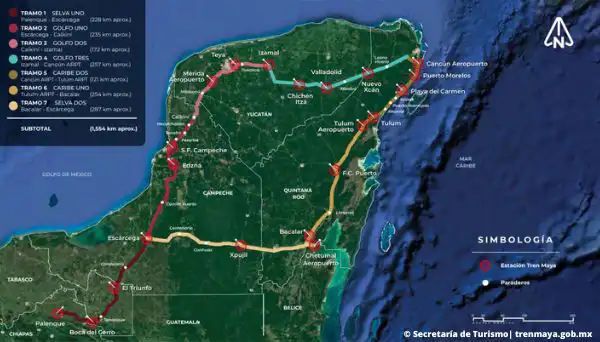CEC Secretariat recommends Tren Maya environmental factual record under USMCA/CUSMA Chapter 24
Montreal, 25 April 2023 — On 17 April 2023 the Secretariat of the Commission for Environmental Cooperation (CEC) recommended developing a factual record to investigate the environmental impact assessment procedures for the Tren Maya project, including relevant studies and alleged fragmentation of the environmental impact studies, as well as the change in land use authorization and the implementation of the citizen complaint mechanism in relation to the project.
The recommendation responds to a Submission on Enforcement Matters, SEM-22-002 (Tren Maya), under Chapter 24 of the US-Mexico-Canada Agreement (USMCA/CUSMA) filed by Moce Yax Cuxtal A.C. and other organizations and individuals (“Submitters”).
The Submitters assert that Mexico is failing to effectively enforce its federal environmental law with respect to the construction of Section 5-South of the “Mayan Train” project in the municipalities of Solidaridad and Tulum in the state of Quintana Roo, Mexico.
The Tren Maya project has a total anticipated length of approximately 1,460 km, crossing the states of Chiapas, Tabasco, Campeche, Yucatan, and Quintana Roo and is expected to have 18 stations. The Submission raises concerns about the environmental impact evaluation and authorization for Section 5-South of the project.
The Submitters state that construction of the project will have an adverse effect on the region because it is being built in a karst topological zone characterized by the presence of a large number of geological phenomena such as fractures, faults, cenotes, enclosed depressions, rapid water infiltration, an abundance of caves and caverns, and an absence of surface streams. The Submitters assert that Section 5-South of the Tren Maya project will damage the region’s ecosystem, particularly the Sac Actun-Dos Ojos underwater system, and will constitute a failure to effectively enforce the Mexican Constitution and various federal laws regarding environmental impact assessment, forest land-use change, wildlife protection and protection of water quality.
In response to the submission, Mexico notified the CEC Secretariat of the existence of pending judicial or administrative proceedings and provided information on the environmental impact and forest land use authorization process for the project. The CEC Secretariat concluded that the pending proceedings did not bar consideration of whether a factual record was warranted and determined that a factual record could shed light on central questions that remain open regarding enforcement of the relevant laws cited in the submission. The CEC Secretariat ultimately determined that the preparation of a factual record is warranted.
The CEC Secretariat finds that a factual record could provide information on the preventive nature of the environmental impact assessment procedure and its effective implementation throughout execution of the Section 5-South of the Tren Maya project. Specifically, a factual record may present information on the existence of various feasibility studies, including soil mechanics, topography, hydrological studies, flora and fauna studies and surveys, identification of collapse zones, risk mitigation and ecological damage to the karst landscape, among others. It may also provide information on the conservation, protection and mitigation measures implemented for the project’s potential effects.
The CEC Secretariat also finds that a factual record would help the public to understand the implementation of the environmental impact assessment procedure process when a project is divided and executed in phases and could present information on the implementation of the citizen complaint mechanism as a mechanism to guarantee the protection and conservation of the environment.
The CEC Secretariat shall prepare a factual record if at least two members of the Council instruct it to do so.
For more information, please visit the CEC’s Registry of Submissions: SEM-22-002 (Tren Maya)

Construction of Section 5 South of the ‘Mayan Train’ infrastructure project has been taking place in a region of the Yucatán Peninsula characterized by many geological fractures, faults, caverns and cenotes.
The CEC SEM Process
The CEC Submissions on Enforcement Matters process supports public participation, information-sharing between governments and the public, and transparency and openness in the effective enforcement of environmental law in North America. If you have reason to believe that an environmental law is not being effectively enforced by Canada, Mexico or the United States, the SEM process may address your concerns.
As of 1 July 2020, the CEC’s SEM process is governed by USMCA Articles 24.27 and 24.28 of the Environment Chapter of the free trade agreement between Canada, Mexico and the United States (CUSMA, T-MEC, USMCA).
Want to learn more about the SEM process? Please watch this two-minute video for an introduction: